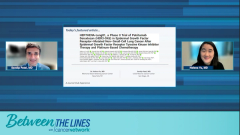
The Evolving Treatment Landscape in EGFR Mutated NSCLC and the Role of Comprehensive Genetic Testing in Guiding Treatment
Dr. Yu and Dr. Patel provide an overview of current standards and recent advances in the treatment landscape for EGFR-mutated NSCLC, emphasizing the critical role of comprehensive genomic profiling in guiding optimal therapy selection and sequencing.
Episodes in this series

This is a synopsis of an Insights series featuring Helena Yu, MD, of Memorial Sloan Kettering Cancer Center, and Sandip Patel, MD, of UCSD Moores Cancer Center.
Dr. Yu provided an overview of epidermal growth factor receptor (EGFR) mutated non-small cell lung cancer (NSCLC). EGFR activating mutations occur in 15-20% of lung cancer patients in the U.S., and up to 50% globally. These mutations lead to activation of the EGFR signaling pathway and sensitize tumors to EGFR tyrosine kinase inhibitors (TKIs). EGFR mutations are enriched in non-smokers, females, and East Asians. The most common mutations are exon 19 deletions (50%) and exon 21 L858R point mutations (40%), but 10-15% have less common mutations like exon 20 insertions and others.
Dr. Patel discussed current treatment options, emphasizing the importance of identifying specific EGFR mutations to guide optimal therapy. Options include osimertinib for canonical exon 19/L858R mutations and amivantamab for exon 20 insertions. Recent studies show promise for chemotherapy plus osimertinib, like in the FLAURA2 trial for patients with central nervous system (CNS) metastases. The MARIPOSA trial is studying amivantamab plus the EGFR/HER2 inhibitor lazertinib and chemotherapy in EGFR-mutant NSCLC.
Dr. Yu’s practice has not changed substantially, with osimertinib monotherapy remaining the benchmark frontline treatment for most EGFR-mutant NSCLC patients. Her group is studying treatment intensification based on circulating tumor DNA (ctDNA) clearance on osimertinib. She is interested in chemotherapy plus osimertinib for higher risk patients like those with CNS metastases, TP53/RB1 mutations, high tumor burden, or who need a deeper response. She awaits mature overall survival data from recent trials to help determine optimal therapy.
The discussants then turned to unmet needs in EGFR-mutant NSCLC. Despite excellent initial responses to EGFR TKIs like osimertinib, most patients eventually develop resistance, commonly from acquisition of the EGFR T790M resistance mutation or MET amplification. The median duration of response is only around 12-14 months. Drs. Yu and Patel discussed the need for therapies that can overcome these resistance mechanisms.
This led to a discussion on the phase 2 HERTHENA-Lung01 trial studying the HER3-targeted antibody-drug conjugate patritumab deruxtecan (HER3-DXd) in EGFR-mutant NSCLC patients who had progressed on osimertinib and platinum chemotherapy. HER3 signaling is an important bypass pathway causing resistance to EGFR TKIs, making it an attractive therapeutic target. Early results show promising antitumor activity for HER3-DXd in this population. Drs. Yu and Patel discussed these findings and next steps for developing HER3-DXd for EGFR-mutant NSCLC.
*Video synopsis is AI-generated and reviewed by Cancer Network editorial staff.
Newsletter
Stay up to date on recent advances in the multidisciplinary approach to cancer.






































